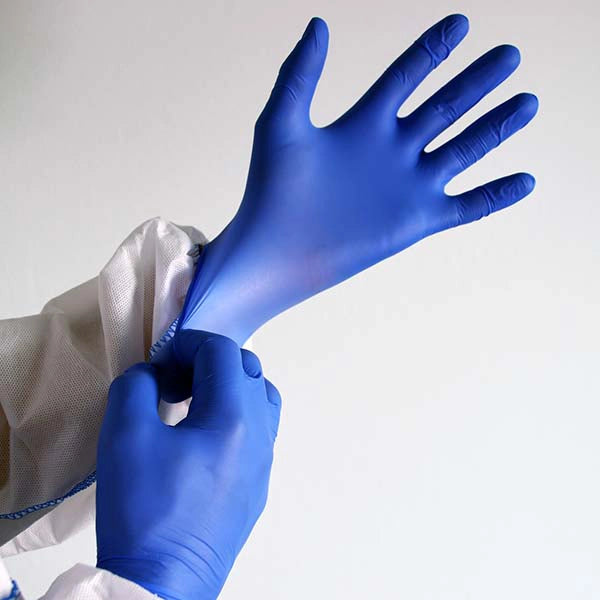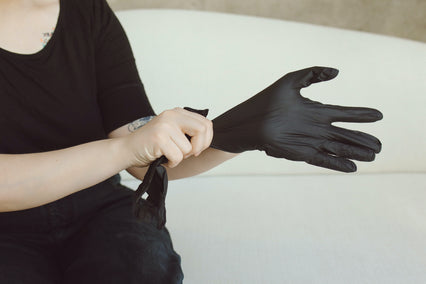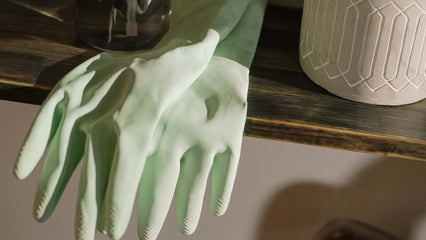Wearing complete personal protective equipment (PPE) is crucial to ensure your safety, especially in dental and medical care. Dentists and medical practitioners need to get close to provide a detailed and accurate diagnosis. Hence, wearing gloves and changing them after every patient is necessary.
However, not all disposable gloves are the same. Some materials, such as latex gloves, might not be ideal for examination or cause allergic reactions. To ensure your and your patient’s safety, wear vinyl gloves for every client and wash your hands thoroughly.
Here are reasons why vinyl gloves are safe for medical use.
What are Vinyl Gloves?
Like neoprene gloves and nitrile gloves, vinyl gloves are made from a synthetic polymer combined with plasticizers and PVC (a type of additive called polyvinyl chloride). As a result, vinyl gloves are sometimes less strong than latex gloves but safer if you or your patient have latex allergies.
You can easily avoid this by wearing fabric liners to absorb sweat.
Vinyl gloves are less stretchable and offer limited protection. When vinyl gloves are stretched, the molecules are also stretched, and the protection it provides is compromised.
These types of gloves are ideal for non-hazardous tasks and environments for a short time. As a result, vinyl gloves are typically used in the food and beverage manufacturing and production industries. They are the best choice for household and commercial use, which requires frequent use and changing.
In addition, vinyl disposable gloves offer protection against dyes, detergents, and low-risk liquids and bodily fluids. If doctors or medical practitioners conduct low-risk examinations, they can use vinyl gloves if they don’t have latex gloves or nitrile gloves.
However, the main advantage of vinyl gloves is their affordability and anti-static properties.
Are Vinyl Gloves Safe For Medical Use?
Vinyl gloves are commonly used in medical settings for various tasks such as examinations and basic patient care. They offer a latex-free alternative, making them suitable for individuals with latex allergies or sensitivities. While vinyl gloves provide an adequate barrier for low-risk procedures and tasks that involve minimal contact with bodily fluids, they are generally less durable and offer less protection compared to nitrile or latex gloves.
Vinyl gloves are less resistant to punctures and tears, which can compromise their effectiveness in high-risk environments. Additionally, they may not provide the same level of dexterity and tactile sensitivity as latex or nitrile gloves, which can be crucial during precise medical procedures. For tasks requiring higher levels of protection and durability, nitrile or latex gloves are often preferred. However, for low-risk situations, vinyl gloves remain a safe and cost-effective option in medical use.
What Types of Gloves are Used by Doctors?
Doctors typically use disposable gloves such as nitrile gloves and latex gloves.

(Photo by Nathan Dumlao from Unsplash)
Numerous doctors have used latex gloves longer than other types of gloves. This is because natural rubber latex is a naturally occurring and accessible material. They are flexible, durable, and comfortable to wear. That is, if you and your patient don’t have latex allergies or sensitive skin.
Here are the reasons why dental and medical professionals commonly use latex gloves:
- Superior dexterity and comfort: Medical-grade latex gloves don’t hinder the doctor’s touch and tactile sensitivities and are perfect for medical and surgical procedures.
- Chemical resistance: Latex is normally resistant to bases, acids, and chemicals, such as iodine, chlorine, and formaldehyde.
- Puncture resistance: Heavy-duty latex gloves last longer and provide puncture resistance, depending on their thickness.
- FDA approved: The US FDA regulates all personal protective equipment, including latex gloves.
While nitrile gloves provide better puncture resistance and comfort. They are easier to remove, and you won’t need to purchase powdered versions. Nitrile is a synthetic rubber that is more durable and long-lasting than latex.
Here are some benefits of using nitrile gloves for dental and medical purposes:
- Excellent pathogen protection: Nitrile surgical gloves are thicker and provide better protection against pathogens from bodily fluids, blood, or liquid.
- Better puncture resistance: Nitrile gloves can be up to 4 times more puncture resistance than latex.
- Comfortable to wear: These types of disposable surgical gloves are more comfortable and can be worn for hours.
- High tactile sensitivity: These medical gloves will not hinder the feeling and dexterity of the wearer.
More About Nitrile Gloves: Neoprene vs Nitrile Gloves: What’s The Difference
What Makes Vinyl Gloves Safe for Medical Use?
Vinyl gloves are not so durable, thick, and comfortable to use. However, some dental and medical professionals still prefer using them in specific tasks and environments. Here are reasons why dental and medical practitioners still use vinyl gloves.
Affordable
To make vinyl gloves, PVC is needed, one of the world's most-produced plastic materials. Hence, vinyl gloves are the most cost-effective and affordable choice for most people.
If you want to save more, ordering Vinyl Gloves in bulk is advisable.
Better Option For Those With Latex Allergies
Vinyl gloves is latex-free. Although not many people have latex allergies, as a dental and medical practitioner, it is still best to take extra precautions. Using latex-free types of gloves is a better option.
Once you or your patient experience rashes, skin irritations, and inflammation while using latex gloves, it is best to remove the gloves and wash your hands thoroughly.
Short-Term Protection Against Chemicals & More
Due to not being too thick or durable, vinyl gloves can provide pathogen protection from liquids, blood, or bodily fluids for a short time. Hence, vinyl gloves are ideal for short procedures or examinations. There is little to less physical contact with pathogens from liquids in examination applications.
If you are wearing vinyl gloves and exposed to blood or bodily fluids with pathogens, remove your disposable gloves, wash your hands properly, apply alcohol or sanitizer, and replace your gloves.
Why gloves.com is the Best Choice for Medical Gloves
Given the necessity of personal protective equipment (PPE) in medical and dental care, selecting the right gloves is crucial. Vinyl gloves offer an affordable, latex-free alternative suitable for short-term, low-risk procedures. However, for more robust protection, nitrile or latex gloves are often preferred.
For a comprehensive range of medical gloves, gloves.com is your go-to source. They provide high-quality options, including vinyl, nitrile, and latex gloves, ensuring you have the right protection for every situation. Plus, with their ongoing discounts and bulk purchasing options, you can equip your practice with the best gloves at competitive prices.
Visit gloves.com today and explore their extensive selection to find the perfect gloves for your needs.
Vinyl Gloves for Medical Use: Frequently Asked Questions
Are vinyl gloves body safe?
Yes, vinyl gloves are generally considered safe for contact with the skin and are often used in various settings, including medical, food handling, and cleaning. They are a latex-free option, making them suitable for people with latex allergies. However, they may not provide the same level of protection and durability as other types of gloves, such as nitrile or latex.
Are vinyl gloves safe for bodily fluids?
Vinyl gloves can provide a basic barrier against bodily fluids, making them suitable for low-risk tasks and general examinations. However, they are less durable and more prone to tearing than nitrile or latex gloves. For tasks that involve a higher risk of exposure to bodily fluids or require more robust protection, nitrile or latex gloves are generally recommended.
What are the side effects of vinyl gloves?
While vinyl gloves are typically safe for use, some individuals may experience skin irritation or allergic reactions due to the plasticizers and other chemicals used in their manufacture. Symptoms can include redness, itching, or a rash. These reactions are generally mild and can be managed by discontinuing use and switching to a different type of glove, such as nitrile or latex. In rare cases, prolonged exposure to these chemicals might cause more severe skin conditions.






